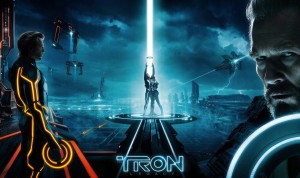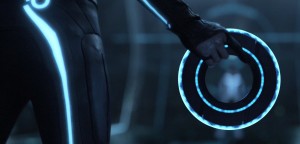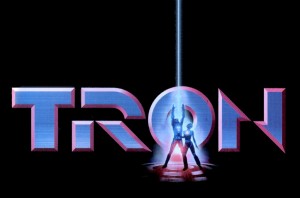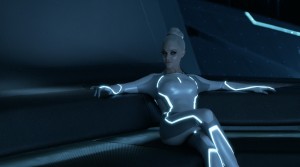 What were YOU expecting from TRON: Legacy? A cursory viewing of this sequel’s 1982 film predecessor, sporting half-baked yet fun ideas stretched across a kaleidoscope of imagery and loosely scrambled religious plot-points (with cameo by Pac-Man), offers a cult classic that’s cute but not innately thoughtful. I adore the first film, no doubt with a mix of nostalgia and art appreciation for what Steven Lisberger was striving for in 1982. If anyone criticizes the new film for being bright on imagery yet light on plot, they obviously wanted a drastic deviation in the franchise. (Example: you don’t go to your local car dealership, test drive a 2011 Mustang GT and then complain it didn’t have character exploration.) TRON: Legacy is a hero’s journey roller coaster with the tone of a theatrical, 3-D theme park.
What were YOU expecting from TRON: Legacy? A cursory viewing of this sequel’s 1982 film predecessor, sporting half-baked yet fun ideas stretched across a kaleidoscope of imagery and loosely scrambled religious plot-points (with cameo by Pac-Man), offers a cult classic that’s cute but not innately thoughtful. I adore the first film, no doubt with a mix of nostalgia and art appreciation for what Steven Lisberger was striving for in 1982. If anyone criticizes the new film for being bright on imagery yet light on plot, they obviously wanted a drastic deviation in the franchise. (Example: you don’t go to your local car dealership, test drive a 2011 Mustang GT and then complain it didn’t have character exploration.) TRON: Legacy is a hero’s journey roller coaster with the tone of a theatrical, 3-D theme park.
 Simply put, the film is gorgeous. Everything in the film is masterfully designed and captured in the camera, from the light and forms to the angles and perspectives and – naturally – the actors and actresses. Joseph Kosinski’s film is “thoughtful” from a retinal perspective, even if – as a franchise sporting a toy line – it only toys with the ideas a smarter film might have delved into. While a film like Inception might take a philosophical idea or two and deep-dive into the myriad extrapolations therein, TRON: Legacy peppers it’s light-lined landscape with notions as numerous as a de-rezzed program’s pixels, leaving admittedly little substance but provocative notions viewers can choose to flesh out as they desire. Personally, I think there’s room in our narrative world for both kinds of story.
Simply put, the film is gorgeous. Everything in the film is masterfully designed and captured in the camera, from the light and forms to the angles and perspectives and – naturally – the actors and actresses. Joseph Kosinski’s film is “thoughtful” from a retinal perspective, even if – as a franchise sporting a toy line – it only toys with the ideas a smarter film might have delved into. While a film like Inception might take a philosophical idea or two and deep-dive into the myriad extrapolations therein, TRON: Legacy peppers it’s light-lined landscape with notions as numerous as a de-rezzed program’s pixels, leaving admittedly little substance but provocative notions viewers can choose to flesh out as they desire. Personally, I think there’s room in our narrative world for both kinds of story.
 28 years ago, TRON gave us a story of a “user” incarnating as a program in the computer world, a game-boy savior demonstrating amazing powers and ultimately self-sacrificing to save and utterly transform that world. We even see Flynn, played by Jeff Bridges, rise in a beam of light… and the world brightens in the wake of his ascension. The former master that enslaved the populace (with his lying insistence that “the users don’t exist!”) is wiped from the system as a new day dawns for former conscripts. Biblical parallels of religious oppression, atheism and a much-needed salvation from beyond our world were thinly veiled and metaphorically messy, but it was still as plain as the nose on your Matrix. The question emerged: where will they go now?
28 years ago, TRON gave us a story of a “user” incarnating as a program in the computer world, a game-boy savior demonstrating amazing powers and ultimately self-sacrificing to save and utterly transform that world. We even see Flynn, played by Jeff Bridges, rise in a beam of light… and the world brightens in the wake of his ascension. The former master that enslaved the populace (with his lying insistence that “the users don’t exist!”) is wiped from the system as a new day dawns for former conscripts. Biblical parallels of religious oppression, atheism and a much-needed salvation from beyond our world were thinly veiled and metaphorically messy, but it was still as plain as the nose on your Matrix. The question emerged: where will they go now?
 Early on, trailers gave us a “CLU” as to a potentially simple parallel… establishing the basic premise that Flynn has created a program in his own image (CLU) that has rebelled against him, and so his son (Sam) is sent into the world to seek and save the lost. Hmmm… does that remind me of something? Sounds like a fairly classical play on Genesis to the incarnation… the “god of the grid” makes a man in his own image and likeness, but the man ultimately decides he will be his own ruler and rebels against his creator. Might the creator-Flynn so love his world that he’ll call for his only son to give the people something to believe in, needed salvation that they might not perish? Sounds like “Tron 3:16″…
Early on, trailers gave us a “CLU” as to a potentially simple parallel… establishing the basic premise that Flynn has created a program in his own image (CLU) that has rebelled against him, and so his son (Sam) is sent into the world to seek and save the lost. Hmmm… does that remind me of something? Sounds like a fairly classical play on Genesis to the incarnation… the “god of the grid” makes a man in his own image and likeness, but the man ultimately decides he will be his own ruler and rebels against his creator. Might the creator-Flynn so love his world that he’ll call for his only son to give the people something to believe in, needed salvation that they might not perish? Sounds like “Tron 3:16″…
 Still, when I landed my butt in the theater seat and was subjected to the full-length of film, muddier messages emerged that what could have been a simple narrative structure. I don’t think what Legacy plays out deletes the already-imperfect analogies of the first film, but it boasts a greater amount of diversity and controversy in its narrative, and potentially leaves us with a far bleaker message than the first installation. In the next two posts we’ll look at how Flynn fails as “god”, fails as “father”, and yet how the film strives to demonstrate a form of redemption for modern man’s failure to model those figures to his son.
Still, when I landed my butt in the theater seat and was subjected to the full-length of film, muddier messages emerged that what could have been a simple narrative structure. I don’t think what Legacy plays out deletes the already-imperfect analogies of the first film, but it boasts a greater amount of diversity and controversy in its narrative, and potentially leaves us with a far bleaker message than the first installation. In the next two posts we’ll look at how Flynn fails as “god”, fails as “father”, and yet how the film strives to demonstrate a form of redemption for modern man’s failure to model those figures to his son.


I also noticed that the maker only saves (chooses) one person and send them to our world – a functional heaven – with his son. She even says its a rescue. Thought that was interesting.
[…] TRON’s Legacy isn’t deep, but appropriately playful […]
[…] TRON’s Legacy isn’t deep, but appropriately playful […]
[…] original Tron from ‘80s and this one looks just as predictable but with much cooler effects. See James Harleman’s thoughts on this film for a good […]
[…] TRON’s Legacy isn’t deep, but appropriately playful […]